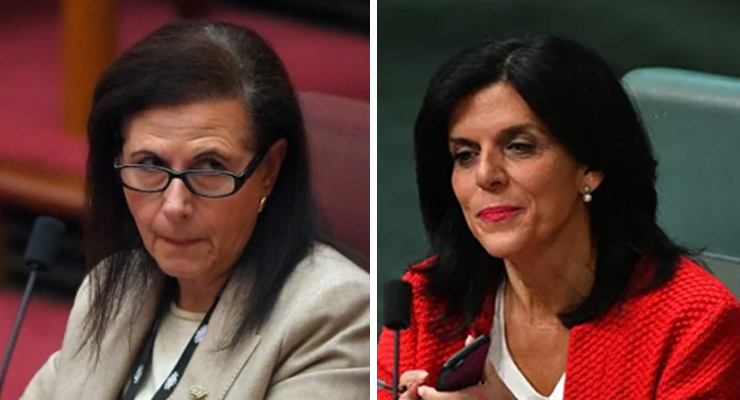
There’s an ever-growing list of women claiming bullying is rife in the Liberal Party, and in a blistering post-budget take-down, Concetta Fierravanti-Wells joined the ranks. It didn’t take long for Scott Morrison to deflect the claims with his reliable and oft-used spin of a woman scorned.
“I know Connie is disappointed,” the prime minister said.
Those five words are all it takes to tell a story of a bitter, rejected woman, as if losing her Senate ticket alone would inspire Fierravanti-Wells to stand up in Parliament and tear Morrison and others to shreds. Her detailed account of toxic factional dealings reduced to an emotional outburst with just one short retort.
It’s no surprise that Morrison wasn’t going to cop the accusations on the chin and instead direct any “specific complaints” of bullying to internal party mechanisms.
His handling of the matter is reminiscent of the treatment of former MP Julia Banks. While Banks and Fierravanti-Wells don’t have much in common politically, the dismissal of their serious and scathing accusations of bullying carry plenty of similarities.
When Banks announced she was not contesting the 2019 election, Morrison quickly took up the line that Banks was struggling personally. “I’m supporting Julia and I’m reaching out to Julia and giving her every comfort and support for what has been a pretty torrid ordeal for her,” he said.
His “concern” framed Banks as a woman unable to cope with the fallout of Malcolm Turnbull’s losing the prime ministership. But in fact — as Banks made abundantly clear in her book Power Play — it was her three months under Morrison’s leadership that led her to call it a day. She described him as “menacing, controlling wallpaper” in her book.
Banks has reflected on how Morrison controlled the narrative to try to get ahead of the bullying accusations, with the story that Banks was “this weak petal that hadn’t coped with coup week”.
Fierravanti-Wells on the other hand was able to get her shots in before she could be framed as mentally unstable, so instead she’s received the straight-up scorned woman framing. Either way the dismissal is the same. Whether before or after the fact, Morrison resorts to the narrative of the emotional woman, too fragile to deal with politics, lashing out without reason.
A study published just last week in the Australian Journal of Social Issues identified this trend in how the Liberal Party handles these cases.
The study considered a number of allegations of bullying and subsequent treatment. As well as Banks, they looked at Julie Bishop, who spoke of witnessing behaviour in Parliament that “wouldn’t be tolerated in any other workplace across Australia”. They also considered Linda Reynolds, who claims there was “bullying and intimidation” before the Turnbull leadership spill, and former senator Lucy Gichuhi who threatened to name and shame the party’s bullies.
The conclusion of the study was that two themes were “routinely mobilised” by the Liberal Party to combat stories of bullying. First, that “politics is tough” and those complaining couldn’t hack it, which takes on a gendered angle when levelled against women who form a minority in the party. The second was the assertion that bullying was experienced equally by men and women, also an attempt to take gender out of the issue.
The report said both strategies were employed to “downplay and legitimise bullying and intimidation as normative and unproblematic”.
Ultimately the scorned woman is a useful political tool. It allows politicians to rely on sexist stereotypes of women to dismiss their complaints. But considering the number of women coming forward from all sides of the Liberal Party, and indeed politics, the unavoidable conclusion should be that they are on to something…








Crikey is committed to hosting lively discussions. Help us keep the conversation useful, interesting and welcoming. We aim to publish comments quickly in the interest of promoting robust conversation, but we’re a small team and we deploy filters to protect against legal risk. Occasionally your comment may be held up while we review, but we’re working as fast as we can to keep the conversation rolling.
The Crikey comment section is members-only content. Please subscribe to leave a comment.
The Crikey comment section is members-only content. Please login to leave a comment.